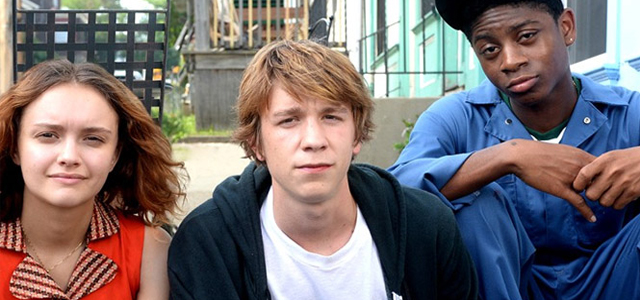(M) Starring: Thomas Mann, Olivia Cooke, RJ Cyler
Have you had a cinematic experience that has left you speechless? By the end of Me and Earl and The Dying Girl, I was at a loss for words. In a good way. While trailers make it look like it will be an independent and quirky version of The Fault in Our Stars, it’s much more than that.
Packaged as a quirky coming-of-age story, Me and Earl and the Dying Girl surprisingly becomes a magnificent drama with an unexpected depth. Rising out of the story of a self-centred teenage boy comes a portrait of loss, love and life. The central character from Jesse Andrews’ novel is Greg (Thomas Mann) who lives a shallow high school existence that is independent of meaningful relationships and conflict. His only friend is Earl (RJ Cyler), a childhood friend who partners with Greg in avoiding most of high school’s trappings. Together, they make film parodies.
Greg and Earl exist throughout their final scholastic year without much drama until Greg is asked by his mother to visit Rachel (Olivia Cooke). She is a classmate who has been diagnosed with leukaemia. Greg and Rachel try to make the best of an awkward situation and satisfy their parental request to connect. Their relationship moves from standoffish to a symbiotic existence. They come to realise they need each other’s support and friendship through this traumatic time. Unlike many John Green novels or John Hughes films, this story has a realistic depth in its many layers of life’s trials.
One of the overarching elements of the film is Greg and Earl’s film-making throughout their formative years. Their search for avant-garde movies allows for a development of a list of classics that should be seen by all film students or movie buffs. One film that should be added to Greg and Earl’s list is the one they are at the centre of.
What Your Kids Are Watching: Me and Earl and and the Dying Girl from The Big Picture on Vimeo.
Me and Earl and the Dying Girl is difficult to classify. Unlike the typical hormonally-charged, coming-of-age films, this story tackles deeper considerations of life and death. With a mix of unconventional humour, Wes Anderson-style visuals and poignant dialogue, it provides the base for a profound narrative.
Mann, Cyler, and Cooke’s performances allow them to develop their characters in a well-paced manner. As the storyline unfolds it makes for an expansiveness that moves beyond cliche and proves to be quite endearing. The young stars are brilliantly supported by veteran cast members who expand the breadth of the script. To support the wealth of acting talent, the stylised cinematography proves to be unsettlingly skilful. The visuals add to the storyline by perfectly depicting the drama portrayed on the screen. The direction of Alfonso Gomez-Rejon manages to deliver an exquisite, emotionally-charged drama that’s only limitation is if it is allowed to be categorised as a mere teen-aged, coming-of-age adventure.
A rare cinematic outing like Me and Earl and the Dying Girl engages with the consideration of loss and death, but provides discussion points about life. One of the key queries that comes out is what we choose to do with this gift of life. Jesse Andrew’s screenplay of friendship is woven together with a confronting evaluation of life, even life after death. This is brought to a head with a dialogue between Greg and his teacher, Mr. McCarthy, that challenges the teen to understand more about the life we live and the life that is left behind for others to remember. In amongst the darkness of death, this film sheds a new kind of light on life. It is entertaining, but produces thoughtful discussion points for a multitude of future conversations.
Leaving the cinema…
Stunned silence. The audience seemed to be overwhelmed with the journey they experienced during this film. An emotional roller-coaster that delivers an overwhelming, experiential ride. Well done to Alfonso Gomez-Rejon for delivering a must-see film.
What are some of the bigger questions to consider from this film?
3. Where can we find real love, hope and joy in this broken world? (Acts 24:14-16, Romans 8:24)
Russell Matthews works for City Bible Forum Sydney and is a film blogger













